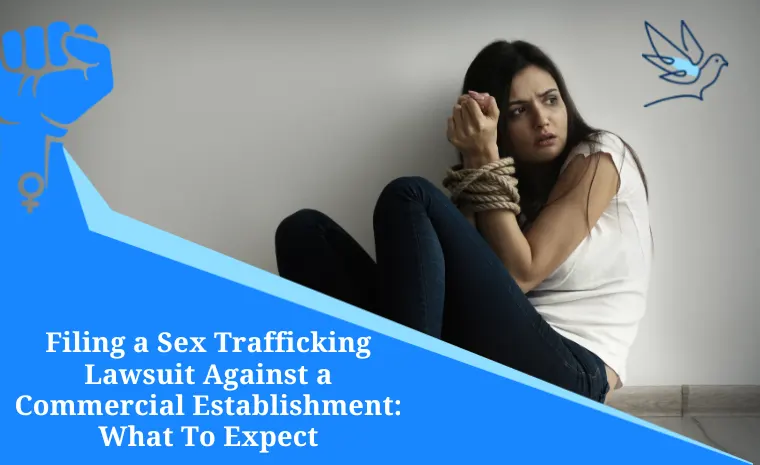Sex trafficking is a vile and horrific crime that preys on the most fragile members of our society. Considered a form of modern-day slavery, DeliverFund estimates that between 15,000 to 50,000 women and children are forced into sexual exploitation in the United States annually. However, the true number varies wildly.
Once under the control of sex traffickers, victims of sex trafficking are forced to provide sexual services for the benefit of the trafficker. Sex trafficking can happen anywhere in the world, and unfortunately, anyone may become a victim of this heinous crime.
In this article, we will discuss:
- What is sex trafficking?
- Who Can File a Sex Trafficking Lawsuit?
- Is filing a sex trafficking lawsuit possible?
- How to File a Sex Trafficking Lawsuit: What to expect
What is Sex Trafficking?
The Centers for Disease Control and Prevention (CDC) defines sex trafficking as a type of human trafficking and states that it has become a serious public health problem, negatively affecting the well-being of victims, families, and communities.

The CDC expounds that human trafficking is a crime that occurs when a human trafficker takes advantage of another individual using force, fraud, or coercion in order for the victim to perform commercial sex acts and labor against their will.
The Trafficking Victims Protection Act of 2000 defines sex trafficking as “the recruitment, harboring, transportation, provision, obtaining, patronizing, or soliciting of a person for the purpose of a commercial sex act.”
Every year, millions of individuals are trafficked all over the world – sadly, this is prevalent in America as well. Any person can become a victim of sex trafficking, regardless of gender, race, or nationality. Sex traffickers use violence, manipulation, and false promises of well-paying jobs and better life as methods to lure in victims.
Sex trafficking victims are more commonly those who experience psychological or emotional vulnerability, economic hardship, homelessness, and a lack of support from society. Due to psychological trauma, many individuals may not identify themselves as human trafficking victims or may fear asking for help.
Who Can File a Sex Trafficking Lawsuit?
Although victims of sex trafficking may be anyone from any demographic, some groups are more vulnerable than others. Some of the most common victims of sex trafficking may include:
1. Women and girls – Research has shown that women and girls are by far the most targeted victims of sex trafficking worldwide; in fact, up to 71% of human trafficking cases involve a female victim. This is likely the result of greater limitations on education, economic opportunities, and social equality for females compared to males.
2. Runaway youth – Runaway or homeless youth may also fall prey to human trafficking crimes and suffer in inhumane conditions. Traffickers abuse this vulnerability due to the victim’s lack of familial ties, economic stability, or social networks.
3. LGBTQ+ individuals – The LGBTQ+ community is significantly more vulnerable to trafficking due to the widespread discrimination and violence they face. This group is often driven into an underground economy, making them even more susceptible to exploitation.
4. Children – Children are particularly vulnerable to human trafficking crimes due to their age, innocence, and inability to protect themselves. Children are also more likely to be victims of sexual abuse and violence.
5. Undocumented immigrants – Due to their lack of legal status, undocumented immigrants are particularly vulnerable to becoming sex trafficking victims. Because of this, they may also be less likely to report sex trafficking criminal activities or seek help from law enforcement.
Is Filing a Sex Trafficking Lawsuit Possible?
Thanks to state and federal regulations, survivors of sex trafficking are now able to hold commercial businesses accountable for profiting off inhumane acts such as sexual exploitation and abuse.
Businesses in the hospitality industry, such as motels and hotels are obligated to ensure that their customers and patrons are in a safe environment. Under Assembly Bill 1788, a hotel may be held liable if a sex trafficking activity occurred in the hotel, and a supervisory employee of the hotel was aware of the activity and failed to inform law enforcement, the National Human Trafficking Hotline, or a victim service organization within 24 hours.
Unfortunately, some in the hotel industry choose to overlook how they could better protect their property from sex traffickers in order to increase their profit margins by avoiding spending money on hotel staff training.
If a business is aware of sex trafficking occurring on its property and does nothing about it, they are legally responsible for its negligence. Therefore, victims who have been trafficked due to this negligence may file a sex trafficking lawsuit.
Sex trafficking survivors may file a claim for compensatory damages and hold the responsible parties accountable. Although filing for compensation will not undo the damage done to sex trafficking victims, it will provide enough financial resources to help them recover.
Holding Hotels and Motels Accountable
About 1,500 filed across the country – accusing major hotel chains such as Marriott, Hilton, and Wyndham of not only overlooking sex trafficking on their properties but also making a financial gain from these illegal activities.
These sex trafficking class action lawsuits against hotels have been filed in both state and federal courts and involve several hotel companies. The following national hotel chains faced legal action for allegedly aiding in sex trafficking:
- Wyndham Hotels & Resorts
- Days Inn
- Best Western
- Hilton Worldwide Holdings, Inc.
- Choice Hotels Corp.
- Extend Stay America
- Red Lion Hotels Corp
- Marriott International
- Super 8
- Motel 6
The human trafficking lawsuits filed against these hotels argued that the hotels would and should have been reasonably aware of the sex trafficking activities occurring on their properties due to an array of evidence, such as online reviews discussing the trafficking activities occurring on the properties.
How To File a Sex Trafficking Lawsuit: What to Expect
If you or someone you know has been a sex trafficking victim in the commercial industry, you may be able to take civil action against those at fault.
Sex trafficking cases can be considerably complex, with many legal and factual concerns. At this point, it is in your best interest to procure an experienced human trafficking lawyer to help guide you through this complex process.
California Civil Code § 52.5 states that the statute of limitations for a human trafficking victim to file a civil lawsuit is seven years from the date the victim was freed. In the case of child sex trafficking, if the victim was a minor during the time the trafficking occurred they have ten years after the age of majority (18 years old) to file a sex trafficking lawsuit.
Having an experienced lawyer by your side will enable you to obtain the legal guidance you need to ensure your claim is valid and well taken care of. Your lawyer will also ensure that your specific needs and goals are met. Your human trafficking attorney will help you navigate the statute of limitations for your potential claim.
Compensatory Damages Available in Sex Trafficking Cases
Human trafficking lawsuits are meant to compensate sex trafficking victims for the physical and emotional pain, psychological distress, and economic losses they may have endured.
A victim may also file a claim for punitive damages. Punitive damages are not just meant to compensate victims. They are also intended to serve as a deterrent and punishment for those who have acted grossly negligent or intentionally.
We are Here to Help
If you or someone you know has been a victim of sex trafficking in the hotel industry and other commercial establishments, the Women’s Rights Group is here to help.
The Women’s Rights Group is a nationwide organization committed to supporting those who have been survivors of sexual abuse in commercial spaces. Our anti-trafficking services have helped numerous women recover the financial compensation they need for a fresh start. Our team at Women’s Rights Group can help get you the medical care and legal representation necessary to help you through this difficult time. Contact us today for a free, confidential consultation or fill up our contact form and find out how we can help you.






